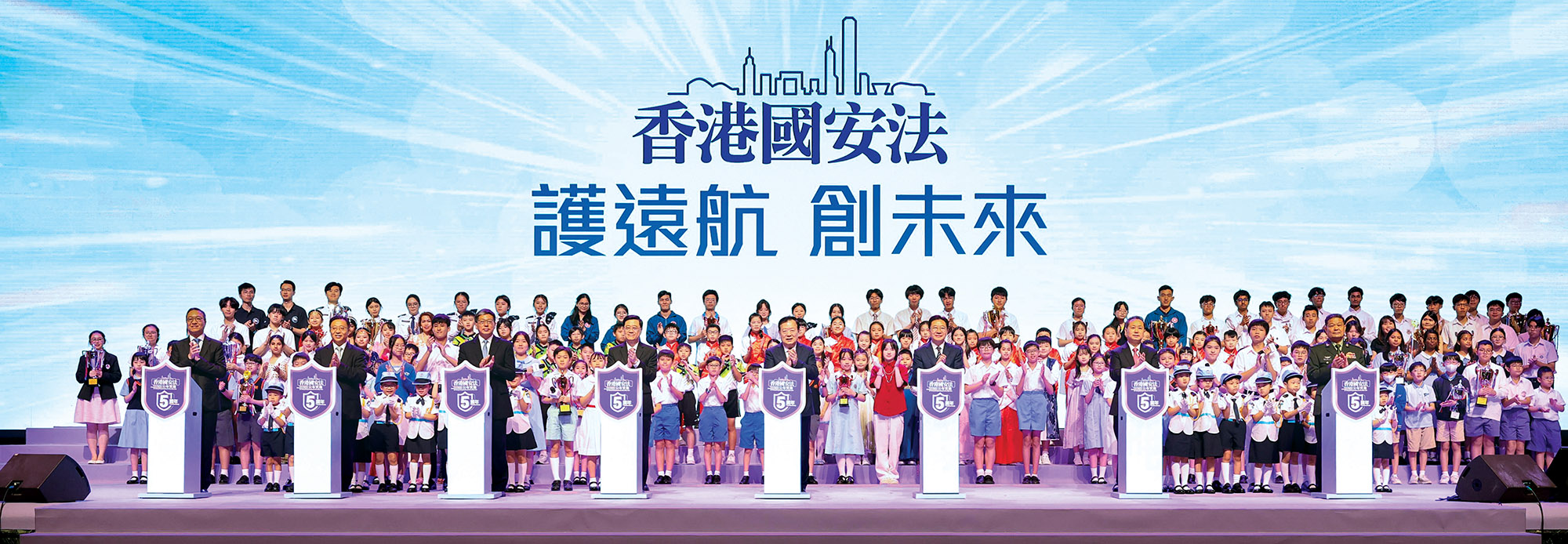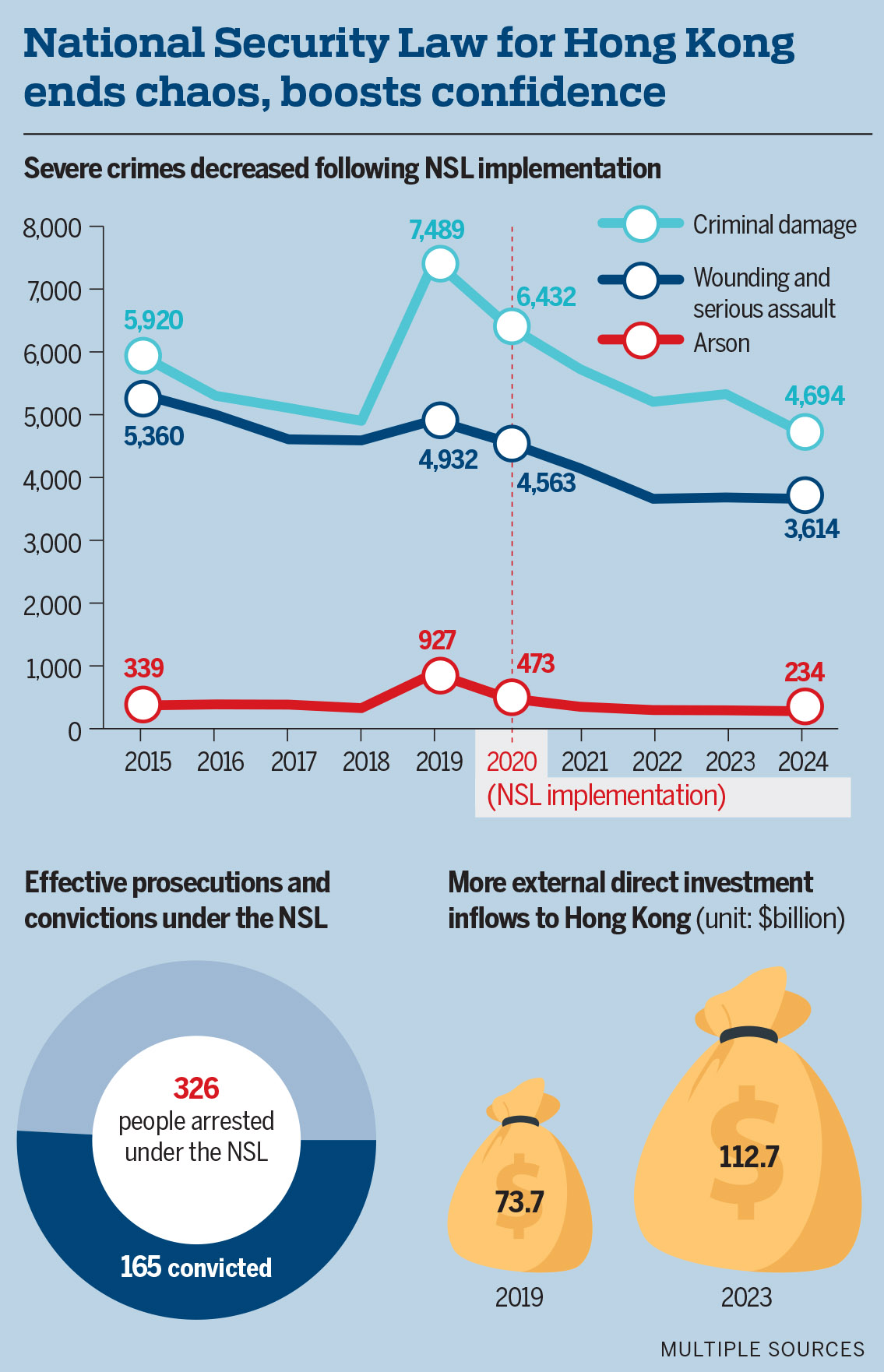Officials recognize law’s decisive role in restoring stability, prosperity

Political heavyweights at a high-profile forum credited the National Security Law for Hong Kong with preventing the collapse of the “one country, two systems” principle during social unrest, and restoring the city’s stability and global financial prominence.
On Saturday, nearly 2,000 officials and community leaders from various sectors of the special administrative region attended the 5th Anniversary of the Promulgation and Implementation of Hong Kong National Security Law Forum. Organized by the Hong Kong SAR government under the theme “Guarding Every Voyage and Forging a Brighter Future”, the event marked the milestone in legislation and aimed to raise public awareness of national security.
In a keynote address, Xia Baolong, director of the Hong Kong and Macao Work Office of the Communist Party of China Central Committee and the State Council’s Hong Kong and Macao Affairs Office, called the NSL the “guardian of the city”.
READ MORE: Xia hails NSL as ‘guardian of city’, urges vigilance against threats
He said that the SAR’s business environment has continued to improve since the law was enacted on June 30, 2020, with its growing appeal for global investors “plain for all to see”.
Xia cited data showing Hong Kong’s rising status as a global investment hub, including a 2024 report that ranked it as the world’s freest economy, and the March release of the Global Financial Centers Index, which placed Hong Kong as the third-largest financial center worldwide.
According to the World Competitiveness Yearbook 2025, Hong Kong has returned to the top three global spots for the first time since 2019 — when social unrest undermined its social order and economic stability. Today, the city leads in investment environment, international trade, commercial law, tax policies, and air cargo services.
Xia emphasized that Hong Kong’s “comprehensive, transformative and fundamental” changes following the NSL include restored stability, better governance, improved national security legislation, and increased patriotism.
He described the law as a “watershed moment” in the city’s transition from chaos to order, addressing security vulnerabilities exposed during the 2019 unrest.
With the NSL in place, Hong Kong has bid farewell to a period of “being undefended” in safeguarding national security, and entered a new chapter of “one country, two systems”, he said.

Xia also warned of the need for vigilance against escalating external threats. He urged the SAR government to adopt a holistic approach to security, addressing non-traditional threats, such as trade suppression, financial risks, and disinformation campaigns, and to ensure that its economic and financial systems remain insulated from systemic risks.
The SAR should leverage its international connectivity to support national strategies, such as the Belt and Road Initiative and the development of the Guangdong-Hong Kong-Macao Greater Bay Area, and uphold the principal of “patriots administering Hong Kong”, while continuing to improve its robust legal system and governance capacity to achieve high-quality development, Xia said.
Also speaking at the forum, Chief Executive John Lee Ka-chiu thanked the central government for decisively promulgating the NSL during Hong Kong’s critical moment.
He said the law’s implementation helped to swiftly restore order and end the violence, fostering stability and further development.
Lee pledged to coordinate development and security efforts, and leverage Hong Kong’s common law strength to enhance the city’s global competitiveness, and help it serve as a superconnector and super value-adder between the Chinese mainland and the world.
He urged local residents to cherish this hard-earned stability, and pledged greater integration into national development and expanded global cooperation.
In a sideline interview with China Daily, Wong Yuk-shan, deputy director of the Hong Kong SAR Basic Law Committee of the National People’s Congress Standing Committee and an environmental biotechnology expert, pointed to evidence of the NSL’s broad benefits, including the University of Hong Kong’s recent rise to 11th place in the global university rankings — a record for Chinese higher education institutions — and its continued appeal in initial public offering markets.
Warning against complacency, Wong stressed the importance of vigilance amid ongoing US-China tensions, which continue to encourage disruptive elements seeking to destabilize Hong Kong.
ALSO READ: Global firms brush aside worries about NSL for Hong Kong
He outlined three priorities — strengthening NSL enforcement; expanding public education on national security; and enhancing youth understanding of constitutional obligations.
Maria Tam Wai-chu, former deputy director of Wong’s committee and a respected lawyer, told China Daily that the surge in global investment proves that the NSL has strengthened — and not weakened — international confidence in Hong Kong.
“These investment flows demonstrate global recognition that Hong Kong remains a fair, law-governed society,” she said, while attributing the city’s “transformation from chaos to stability and prosperity” to the NSL.
“The HKSAR serves as both China’s gateway to the world and the world’s gateway to China. Without a strong patriotic commitment to safeguard national security, sovereignty and development interests, we’ll lose confidence in international engagement and become vulnerable to external influence,” she said, adding that chaos would make development impossible in Hong Kong.
Contact the writer at lilei@chinadailyhk.com


